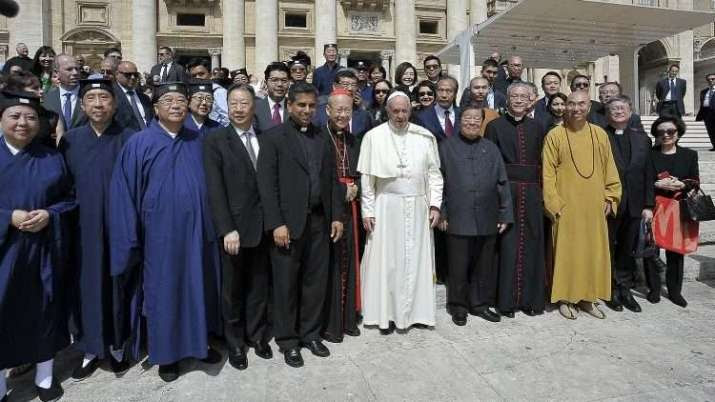By Shyamal Sinha

Interreligious dialogue is best defined as intentional encounter and interaction among members of different religions as members of different religions. There is quite a variety of types of interreligious dialogue, with no overall agreement about what these types are: official or institutional dialogue between or among elites chosen by their religions as official representatives, parliamentary-style dialogue, verbal dialogue, intervisitation, spiritual dialogue, practical dialogue, and internal dialogue. This article traces the history of interreligious dialogue and discusses its contemporary importance and dynamics, as well as principles and theory. It uses the dialogue between Jews and Christians to exemplify intercommunity dialogue and the dialogue between Buddhists and Christians to exemplify dialogue for personal growth.
During his Wednesday General Audience on 12 June, Pope Francis received the Hong Kong Special Administrative Region’s top interreligious body, whose members were visiting the Vatican to celebrate the 40th anniversary of the Pontifical Council for Interreligious Dialogue. The body, known as the Colloquium of Six Religious Leaders of Hong Kong, is composed of representatives of six associations that speak as one voice for the major religions of Hong Kong: Master Leung Tak-wah, chairman of the Hong Kong Taoist Association, Most Venerable Kuan Yun, president of the Hong Kong Buddhist Association, Cardinal John Tong-hon, apostolic administrator of Hong Kong, Dr. Tong Yun-kai, president of the Confucian Academy, the Reverend Canon Peter Koon, provincial secretary general of the Anglican Church, and Sat Che-sang Ibrahim, chairman of the Chinese Muslim Cultural and Fraternal Association.
The Pontifical Council for Interreligious Dialogue is formally a dicastery (department) of the Roman Curia (the administrative bodies of the Holy See). It was erected on 19 May 1964 by Pope Paul VI and renamed by Pope John Paul II on 28 June 1988. Each year the Council releases a message on a determined date for Vesak—the festival commemorating the life of the Buddha—focusing on a theme or goal that Buddhists and Christians can work toward.
The Hong Kong-based religious leaders expressed their esteem for the Pontifical Council for Interreligious Dialogue to the Vatican press office: “This is the first time our six religions in Hong Kong have the opportunity to come to visit the Holy See, and this is indeed a very special trip,” said Rev. Koon. (Vatican News)
Meanwhile, Most Venerable Kuan Yun emphasized the importance of harmony as a foundation for dialogue: “As human beings, we have to rely on one another in order to survive and be well, and we have to accommodate one another so that we can thrive. If we are in harmony in our thoughts, we won’t fight one another. We don’t have to be weavers to have clothes to wear. We don’t have to be farmers to have food to eat.” (Vatican News)
“During these 40 years, we have had an official gathering twice a year,” said Cardinal Tong. “We also have many gatherings [to discuss] particular issues that affect the 7.4 million people living in Hong Kong.” (Vatican News)
This year’s Vesak message from the council focused on the empowerment of the female gender, stating: “In our day, violence against women and young girls is a global problem, affecting as much as a third of the world’s female population. Situations of conflict, post-conflict and displacement favour such violence. Women and young girls are especially vulnerable to human trafficking and modern slavery, and these forms of brutality negatively and often irreversibly affect their health. To counter these injustices, it is vital to provide young women and girls access to education, to guarantee them equal pay for equal work, to ensure the recognition of their inheritance and property rights, to overcome their under-representation in politics, government and decision-making, to address the issue of dowries, and so forth. The promotion of women’s equal dignity and rights should also be reflected in interreligious dialogue: more women need to have a place at the table, where they are still outnumbered by men.” (Holy See Press Office)
source – Buddhistdoor Global











